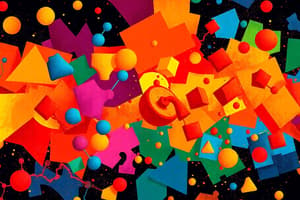Podcast
Questions and Answers
What is the primary function of carbohydrates in cells?
What is the primary function of carbohydrates in cells?
- To speed up chemical reactions
- To store energy and provide structural support (correct)
- To provide structural support
- To store and transmit genetic information
Which type of macromolecule is responsible for transporting substances in cells?
Which type of macromolecule is responsible for transporting substances in cells?
- Carbohydrates
- Lipids
- Proteins (correct)
- Nucleic acids
What are the building blocks of proteins?
What are the building blocks of proteins?
- Monosaccharides
- Amino acids (correct)
- Nucleotides
- Fatty acids
What is the main function of lipids in cells?
What is the main function of lipids in cells?
What type of macromolecule includes DNA and RNA?
What type of macromolecule includes DNA and RNA?
What is the general term for large molecules formed by joining smaller organic molecules together?
What is the general term for large molecules formed by joining smaller organic molecules together?
Flashcards are hidden until you start studying
Study Notes
Macromolecules
- Macromolecules are large molecules formed by joining smaller organic molecules together.
- Organic compounds are carbon-based substances that are the basis of living matter.
- Polymers are molecules made from repeating units of identical or nearly identical compounds called monomers.
Types of Macromolecules
- There are four types of macromolecules: carbohydrates, lipids, proteins, and nucleic acids.
Carbohydrates
- Carbohydrates are made of carbon, hydrogen, and oxygen.
- Examples of carbohydrates include sugars and starches.
- Monosaccharides are simple sugars.
- Polysaccharides are complex sugars that include starches, cellulose, and glycogen.
- Carbohydrates can be broken down to provide cells with energy.
- Some carbohydrates are part of cell structure.
- Functions of carbohydrates:
- Store energy
- Provide structural support
Lipids
- Lipids are macromolecules made of fatty acid monomers.
- Types of lipids include triglycerides, phospholipids, and steroids and waxes.
- Lipids include fats, oils, and cholesterol.
- Fats and oils contain fatty acids and glycerol.
- The cell membrane is made up of a lipid called phospholipid.
- Functions of lipids:
- Store energy
- Provide barriers (as in cell membrane)
Proteins
- Proteins are made of amino acids.
- There are 20 types of amino acids used to build different proteins.
- Proteins differ in the number and order of the amino acids that make them.
- Functions of proteins:
- Transport substances
- Speed up reactions
- Provide structural support
- Make hormones
Nucleic Acids
- Nucleic acids are made of monomers called nucleotides.
- Examples of nucleic acids are DNA and RNA.
- Function of nucleic acids:
- Store and transmit genetic information.
Studying That Suits You
Use AI to generate personalized quizzes and flashcards to suit your learning preferences.




